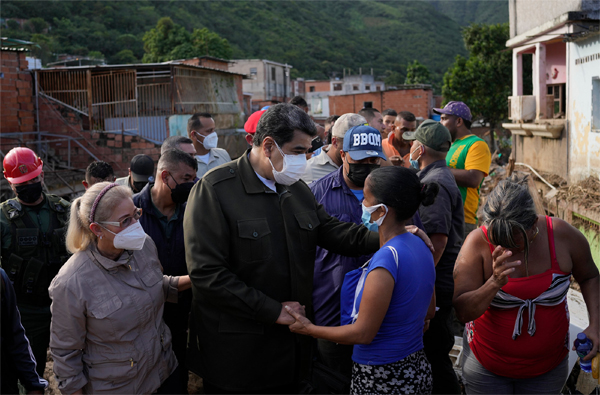
Andreina Itriago Acosta and Patricia Laya, Bloomberg News
CARACAS
EnergiesNet.com 12 21 2022
Venezuela President Nicolas Maduro, who has been holed up in Caracas for most of the past four years, is making rare trips outside the capital to survey the damage caused by massive landslides in an attempt to shore up his diminished popular support.
Donning military fatigues and flanked by security, Maduro made two visits in the past week to Las Tejerias and Maracay, cities a few hours from Caracas that have borne the brunt of landslides caused by storms that have killed at least 57 and left dozens missing.
“For any of you in shock over losing everything and seeing their town destroyed, I came to say, ‘We are not going to abandon you. We are going to be with you until Las Tejerias is reborn,” he told a crowd Monday after shaking hands and examining mud-filled streets full of ruined homes, toppled trees and overturned cars.
While the visits reflect the gravity of the flooding, they also represent an opportunity for Maduro to shore up his support ahead of presidential elections in 2024 in which he is widely expected to run for a third, six-year term. As the 59-year-old approaches a decade in office since taking over from the late Hugo Chavez, he is trying lift an approval rating hovering around 20% and display an image of stability, analysts said.
“It is evident that there are electoral intentions there, but Maduro also wants to show that he is back on the ground,” said Ricardo Sucre, a professor of political science at the Central University of Venezuela in Caracas. “The government’s logic is that there are elections coming and they need to prepare. Chavismo is conscious that they need to reach more people.”
Destroyed Homes
Days of torrential rains caused by tropical storms have caused huge mudslides in several states across the country, washing out bridges, destroying more than 20,000 homes and closing roads. Dozens have been killed. Maduro traveled on Oct. 10 to Las Tejerias, a city of about 50,000 people located some 50 miles from Caracas. He made a second trip on Monday to Las Tejerias and Maracay, an industrial city northwest of the capital.
The public appearances are uncommon for a president who has mostly kept to the confines of the presidential palace since a 2018 attack by explosive-laden drones during a military parade in Caracas. Maduro emerged unharmed, but the attempt — along with massive street marches against him and uproar over a crumbling economy — contributed to his withdrawal from public appearances.
He relied heavily on near-daily appearances on state television, which can last hours, and rarely left the country. That began to change earlier this year. In the past few months Maduro has held massive rallies alongside his family members, where catchy pop tunes rattle lyrics such as “the people rule with Maduro.” In June, he toured six countries in the Middle East and Europe in 10 days aiming to raise foreign investment.
Opposition parties have said they plan to compete in 2024 after holding primaries next year, emboldened by their gubernatorial victory in a Chavista stronghold earlier this year.
The Venezuelan electoral council sets the window for political campaigning when it announces the election date. But for most Venezuelans, Maduro’s recent push is a clear sign he’s entered campaign mode. In a televised address Sept. 22, Maduro said the Socialist party was preparing for victory in 2024 and legislative elections in 2025, though he said campaign season has not started. Maduro has yet to formally announce his candidacy.
The Communications Ministry did not respond to a request for comment.
Roughly half of Venezuelans said Maduro should not stay in power beyond 2024 in a recent survey. He is trying to bolster his popularity by talking up an economic rebound estimated at around 20% this year.
Signs featuring a large yellow, blue and red “M” for Maduro alongside the slogan “Together we are more” have been popping up near infrastructure projects in the past weeks. The president has also promoted a mobile app with which citizens can log their complaints, from power outages to potholes, in what he calls a direct line from people to the government.
“For Maduro I think it is really too late to seek popularity. What he seeks is acceptance,” said David Smilde, professor and Venezuela expert and Tulane University. “If he shows himself as omnipresent and as the most important way people can satisfy their needs, it will reduce people’s interest in opposing him.”
bloomberg.com 12 19 2022












